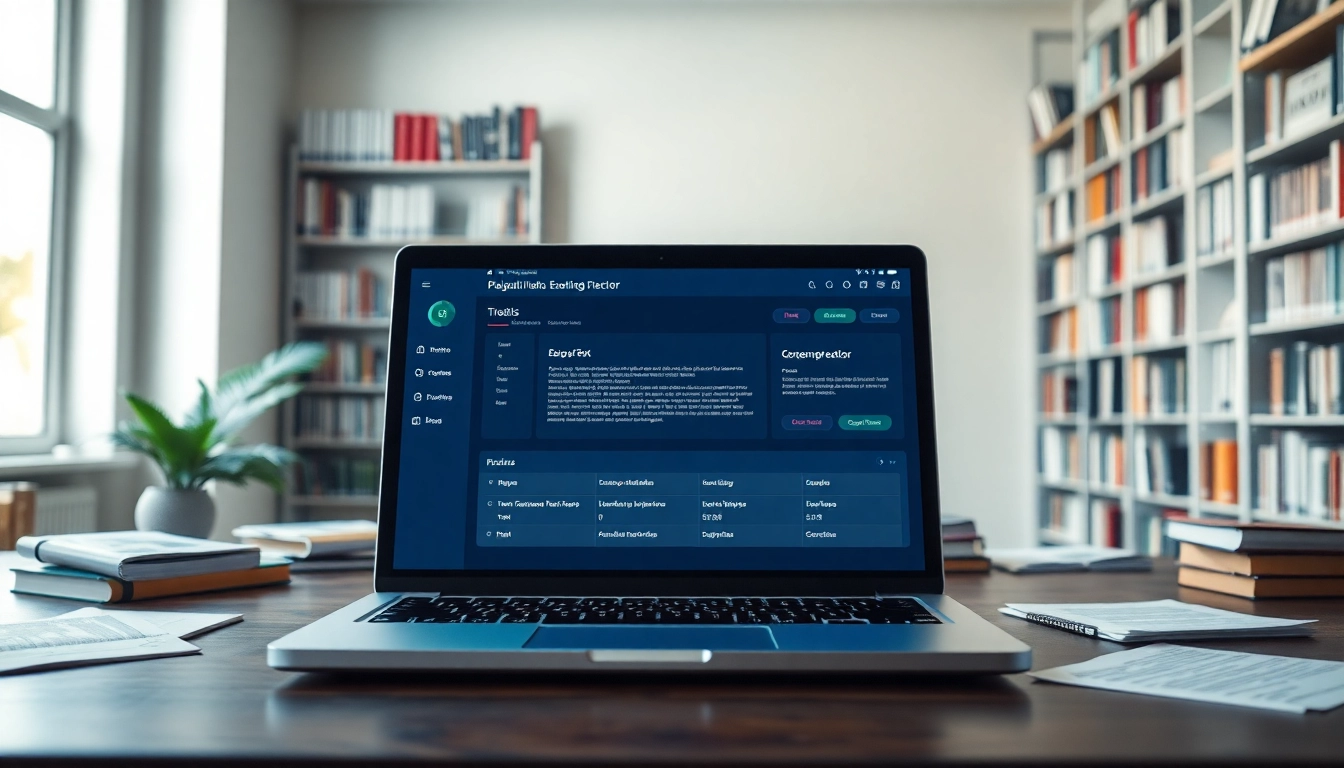Introduction to NVQ Level 7 Construction Senior Management
The NVQ Level 7 diploma in Construction Senior Management is a professional qualification aimed at those who aspire to take on senior managerial roles in the construction industry. This qualification is designed to provide candidates with a comprehensive understanding of management practices, strategic planning, and the execution of complex construction projects. As construction projects become increasingly sophisticated and regulated, the demand for highly qualified professionals in senior positions has never been higher. For those pursuing this qualification, acquiring the right knowledge and skills is crucial for both personal and professional growth. A vital resource for this endeavor is the nvq level 7 construction senior management answers which can provide guidance on the assessments involved.
Understanding the NVQ Qualification Framework
The NVQ framework is a structured path designed for vocational qualifications across various sectors. The National Vocational Qualification (NVQ) Level 7 is equivalent to a Master’s degree and is aimed at individuals who already possess significant experience in the workplace. The NVQ system is competency-based, which means that it is focused on the skills, knowledge, and understanding necessary to perform specific job functions safely and effectively.
At this level, candidates are expected to exhibit higher-level thinking, the ability to operate independently with minimal supervision, and the skills to influence outcomes through effective leadership and decision-making. The NVQ structure allows for assessment through practical demonstrations, professional discussions, and work products that reflect real-life scenarios, ensuring that the qualification is relevant to everyday challenges faced by senior managers in construction.
Key Responsibilities of Senior Managers
Senior managers in construction must navigate a multitude of responsibilities that are critical to the success of projects and the overall health of an organization. Some key responsibilities include:
- Strategic Planning: Formulating long-term operational strategies that align with the company’s goals.
- Resource Allocation: Efficiently allocating resources, including budget, manpower, and time, to optimize performance and minimize waste.
- Health and Safety Compliance: Ensuring all operations comply with legal and regulatory standards regarding health, safety, and welfare of employees.
- Quality Control: Establishing processes to maintain high quality standards throughout all phases of construction.
- Stakeholder Engagement: Engaging effectively with clients, contractors, regulatory bodies, and other stakeholders to ensure project expectations are met.
These responsibilities demand not only expert knowledge but also a soft skill set that includes leadership, negotiation, and effective communication. Managing these diverse responsibilities proficiently can differentiate a successful manager from their counterparts and steer projects toward success.
Importance of NVQ Level 7 in Career Advancement
Attaining the NVQ Level 7 diploma in Construction Senior Management is a significant milestone for individuals looking to propel their careers to new heights. This qualification demonstrates a commitment to professional development, enhancing job prospects in a competitive job market. Some of the key benefits include:
- Increased Credibility: Holding an NVQ Level 7 qualification can bolster an individual’s credibility with employers, clients, and peers, establishing them as an authority in their field.
- Career Progression Opportunities: With this qualification, professionals may explore higher-level positions or specialized roles, unlocking new career possibilities within the industry.
- Networking Opportunities: Being part of a recognized qualification program opens up pathways to connect with fellow professionals, industry leaders, and potential employers.
- Enhanced Skillset: The holistic training and assessments challenge candidates to develop a broad range of skills that translate to improved job performance.
Therefore, the NVQ Level 7 not only contributes to personal development but also offers tangible benefits that can significantly affect an individual’s career trajectory in construction management.
Core Units of the NVQ Level 7
Unit Breakdown and Requirements
The NVQ Level 7 in Construction Senior Management consists of various core units designed to assess a candidate’s competencies across crucial management areas. Understanding the structure and content of these units is essential for successful completion. Here is a breakdown of some core units:
- Unit 1: Leadership and Management – Focuses on leading teams effectively and managing complex situations associated with construction projects.
- Unit 2: Managing Finance – Involves understanding financial management principles, including budgeting, cash flow, and financial reporting.
- Unit 3: Project Management – Covers concepts and strategies in managing construction projects from inception to completion.
- Unit 4: Health, Safety, and Environmental Management – Encompasses statutory requirements, risk assessments, and the implementation of safety management systems.
- Unit 5: Stakeholder and Relationship Management – Highlights techniques for managing stakeholder expectations and developing professional relationships.
Each unit typically comes with specific requirements regarding the knowledge and skills that a candidate must demonstrate. Mastery of both theoretical principles and practical applications is crucial for successful evaluation.
Assessments and Evaluation Criteria
Assessments for the NVQ Level 7 are designed to evaluate practical competencies in real-world scenarios. This can include:
- Portfolio Submission: Candidates must compile evidence of their work, which demonstrates their ability to meet the criteria for each unit.
- Professional Discussions: Assessors may engage candidates in discussions to evaluate their understanding of key principles and their application in work settings.
- Direct Observations: Candidates are often observed in their work environment to witness their skills in action and assess their effectiveness in real-time.
- Feedback from Colleagues: Recommendations and evaluations from peers and supervisors can provide additional context regarding a candidate’s abilities and contributions.
These assessments are holistic and allow candidates to show their competence across various areas related to senior management in construction. Proper preparation and understanding of assessment criteria are essential for successful completion.
Examples of Answer Formats
When preparing submissions for assessments, candidates must be aware of the recommended formats for presenting their answers. Some common formats include:
- Written Reports: Comprehensive documents that provide an in-depth analysis of specific topics, supported by data and references.
- Case Studies: Real or hypothetical scenarios requiring candidates to analyze situations and propose solutions.
- Reflective Journals: Personal accounts reflecting on learning experiences, challenges faced, and outcomes achieved during their managerial roles.
Understanding the best practices for these formats can greatly enhance the quality of submissions, demonstrating clarity of thought, analytical skills, and professional communication.
Best Practices for Completing NVQ Level 7 Assignments
Strategies for Efficient Study and Research
Completing assignments for the NVQ Level 7 requires a strategic approach to studying and research. Here are some effective strategies:
- Create a Study Schedule: Developing a structured timetable can help balance personal commitments with study time, ensuring sufficient attention is given to each unit.
- Utilize Diverse Resources: Access a wide range of study materials such as textbooks, online courses, articles, and professional journals to enhance understanding.
- Engage in Group Studies: Collaborating with peers can foster knowledge sharing, provide different perspectives, and create an environment for motivation.
- Seek Guidance: Do not hesitate to reach out to mentors, tutors, or professionals who can provide insights, clarify concepts, or share practical experiences.
Implementing these strategies can significantly streamline the process of preparing for assessments and enhance the quality of the work submitted.
Time Management Techniques
Effective time management is integral to the successful completion of NVQ Level 7 assignments. Here are several techniques that can assist in managing time efficiently:
- Prioritize Tasks: Identify the most critical tasks to complete first, focusing on deadlines and importance to ensure priority assignments are addressed timely.
- Set Short-term Goals: Break down large tasks into manageable segments and set achievable deadlines for each segment.
- Avoid Procrastination: Set specific times for study and stick to them; create an environment conducive to learning, free from distractions.
- Use Technology Tools: Leverage applications and tools for time tracking, reminders, and task management to keep organized.
Applying these techniques can lead to improved productivity, allowing for a more systematic approach to assessments.
Preparing for the Assessor’s Requirements
Understanding the assessor’s expectations is crucial for successful evaluation. Here are steps to ensure preparedness:
- Read Assessment Guidelines: Thoroughly familiarize yourself with assessment criteria and guidelines provided by the awarding body.
- Collect Evidence: Gather relevant evidence that supports your claims and showcases the competencies required for each unit.
- Practice Mock Assessments: Engaging in mock assessments can prepare you for real assessments, boosting confidence and competence.
By aligning your preparation with the assessor’s expectations, you increase the likelihood of successful outcomes in assessments.
Common Challenges in NVQ Level 7 Construction Management
Addressing Knowledge Gaps
One of the common challenges faced by candidates pursuing the NVQ Level 7 is identifying and addressing knowledge gaps. Recommended approaches include:
- Diagnostic Assessments: Taking initial assessments to highlight areas of weakness can provide direction on where to focus learning efforts.
- Targeted Learning: Engage in further professional development courses or workshops that specifically address weaker areas
- Consulting with Experts: Seek mentorship from industry professionals who can guide you through complex concepts or practices.
By proactively addressing knowledge gaps, candidates can build a more robust foundation and knowledge set required for senior management roles.
Navigating Complex Scenarios and Case Studies
Dealing with complex construction scenarios requires critical thinking and problem-solving skills. Strategies to navigate these include:
- Critical Analysis: Utilize analytical frameworks to break down complex scenarios into manageable components, assessing challenges more effectively.
- Simulations: Engage in simulation exercises or role-plays, if available, to practice problem-solving in a risk-free environment.
- Group Discussions: Collaborate with peers to discuss case studies and share diverse thoughts on potential solutions.
Developing a methodical approach to complex scenarios can significantly enhance problem-solving capabilities required in senior management.
Seeking Support from Peers and Mentors
Networking and seeking support is essential for success in the NVQ Level 7 program. Here are effective ways to seek support:
- Join Professional Associations: Engage with professional bodies relevant to construction management, providing access to resources and networking opportunities.
- Create Study Groups: Form study groups with fellow candidates to share resources, discuss challenges, and brainstorm solutions collaboratively.
- Social Media Networks: Utilize platforms like LinkedIn to connect with industry experts, alumni, and others who can provide advice and mentorship.
Building a strong support network can reduce feelings of isolation, provide insights from others’ experiences, and foster an environment conducive to learning and professional growth.
Success Metrics and Continuous Professional Development
Evaluating Performance in Assessments
Success in the NVQ Level 7 assessments is measured by several metrics that contribute to overall performance evaluation:
- Achievement of Learning Outcomes: Assessors evaluate how well candidates meet the specified learning outcomes for each unit.
- Quality of Evidence Submitted: The relevance, depth, and clarity of submitted evidence play a significant role in grading.
- Feedback from Assessors: Receiving constructive feedback can offer insights into performance and areas for improvement.
Understanding these metrics can help candidates focus their efforts more strategically and plan their submissions effectively to maximize success rates.
Continuing Education and Further Qualifications
Upon completion of NVQ Level 7, professionals should consider further avenues for education and growth. This might involve:
- Advanced Courses: Pursuing specialized courses or certifications that may bolster one’s expertise in certain areas of construction management.
- Engaging in Research: Participating in academic research, contributing to industry knowledge, and maintaining up-to-date insights on emerging trends.
- Professional Development Events: Attending seminars, workshops, or conferences to advance knowledge and network with industry leaders.
Continuous professional development is critical in navigating the evolving landscape of the construction industry and maintaining relevance as a senior manager.
Building a Professional Network for Future Opportunities
Networking is a vital aspect of career success in construction management. To build a strong professional network:
- Participate Actively: Engage in discussions, events, and forums within industry associations to establish a presence.
- Leverage Digital Platforms: Utilize platforms like LinkedIn to connect with past colleagues, classmates, and industry leaders.
- Mentorship: Seek out mentorship opportunities to learn from experienced professionals while giving back to others entering the field.
A strong professional network can open doors to new job opportunities, partnerships, and collaborations that are essential for growth in construction management careers.















Leave a Reply